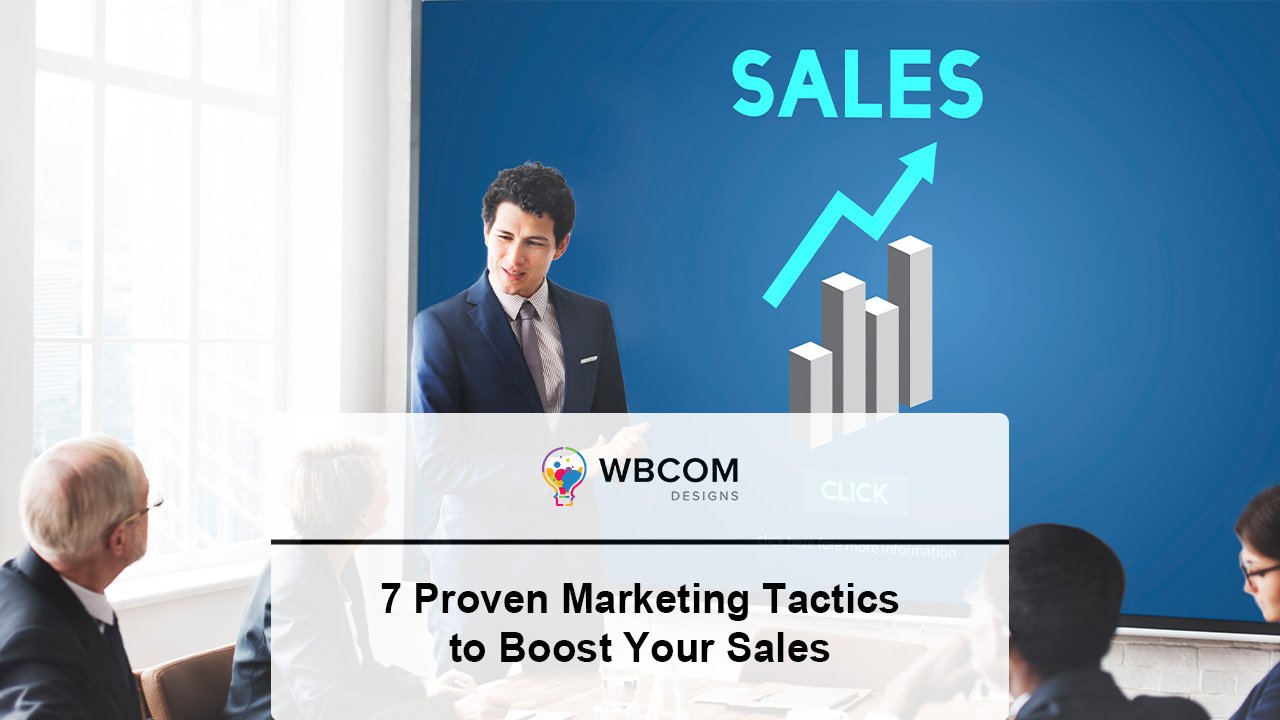Are you tired of lackluster sales figures despite your marketing efforts? Are you looking for proven strategies to take your business to the next level? Look no further. In today’s competitive business landscape, marketing tactics can make or break your success. Understanding the latest and most effective marketing tactics is crucial whether you’re a small business owner or a marketing professional. In this blog post, we’ll delve into seven proven marketing tactics that will help you boost your sales and take your business to new heights. We’ve got you covered from social media to content marketing, email campaigns to customer retention. So sit back, grab a pen, and get ready to take notes, because by the end of this post, you’ll be equipped with the tools you need to drive growth and achieve your business goals.
Social Media Marketing
Social media has become an integral part of our lives, and for businesses, it has emerged as a powerful marketing tool. With more than 4.2 billion active social media users worldwide, social media platforms such as Facebook, Instagram, Twitter, LinkedIn, and others have allowed businesses to reach and engage with their target audience like never before.
Here are some of the key reasons why social media is important for businesses:
- Increased Brand Awareness: Social media allows businesses to connect with their target audience, build relationships, and increase brand awareness. With the ability to share content, engage with followers, and build a community, businesses can establish a strong online presence and get their brand in front of potential customers.
- Targeted Advertising: Social media platforms offer advanced targeting options that enable businesses to reach their ideal customer. From age, location, interests, and behaviors, social media advertising allows businesses to target their message to a specific audience, increasing the chances of converting them into customers.
- Customer Engagement: Social media allows businesses to engage with their customers in real-time, providing a platform for two-way communication. This allows businesses to build stronger customer relationships, respond to queries and concerns, and improve overall customer satisfaction.
When it comes to social media marketing, there are some best practices that businesses should follow to ensure success:
- Define your goals: Before starting any social media marketing campaign, it’s important to define your goals. Are you looking to increase brand awareness, generate leads, or drive sales? Defining your goals will help you create a focused and effective strategy.
- Know your audience: Understanding your target audience is key to creating a successful social media campaign. This includes knowing their interests, behavior, demographics, and pain points.
- Create engaging content: Social media is a highly visual medium, and businesses need to create eye-catching and engaging content. This includes images, videos, infographics, and other forms of visual content.
- Consistency is key: Consistency is important in social media marketing, as it helps to build trust and establish a strong online presence. Businesses should create a content calendar and post regularly to engage followers.
Now, let’s take a look at some successful social media marketing campaigns:
- Wendy’s #NuggsForCarter: In 2017, Wendy’s ran a Twitter campaign called #NuggsForCarter, where a teenager named Carter Wilkerson asked Wendy’s how many retweets he needed to get free chicken nuggets for a year. Wendy’s responded with a challenge: 18 million retweets. The tweet went viral, and although Carter didn’t reach the target, he got over 3.4 million retweets, making it the most retweeted tweet of all time.
- Airbnb #WeAccept: In 2017, Airbnb launched a campaign called #WeAccept, which was a response to the US travel ban. The campaign featured a video that showcased the diversity of its hosts and guests and aimed to promote inclusion and diversity. The campaign received widespread media coverage and praise for its message.
- Coca-Cola #ShareACoke: In 2014, Coca-Cola launched a campaign called #ShareACoke, which featured bottles with people’s names on them. The campaign aimed to encourage people to share a Coke with their friends and family and generated a significant amount of user-generated content and engagement.
Content Marketing
Content marketing involves creating and sharing valuable, relevant, and consistent content to attract and retain a clearly defined audience and ultimately drive profitable customer action. The content can take various forms, including blog posts, videos, podcasts, social media posts, whitepapers, case studies, and more.
Here are some reasons why content marketing is important:
- Build brand awareness and reputation: Content marketing can help businesses build their brand reputation by providing valuable and informative content that establishes them as thought leaders in their industry.
- Improve SEO: Search engines prioritize websites that have high-quality, relevant content. By creating content that is optimized for search engines, businesses can improve their rankings and drive more traffic to their website.
- Increase customer engagement: Content marketing can help businesses engage with their customers and build stronger relationships with them.
Types of content marketing include:
- Blogging: Blogging is one of the most popular forms of content marketing. By creating blog posts on topics related to their industry, businesses can establish themselves as thought leaders and provide valuable information to their audience.
- Social Media: Social media platforms such as Facebook, Twitter, LinkedIn, and Instagram offer businesses an opportunity to reach and engage with their target audience through visual and written content.
- Videos: Video content has become increasingly popular, with businesses using it to promote their products and services, share customer testimonials, and create how-to guides.
Here are some tips for creating effective content marketing campaigns:
- Define your audience: It’s important to clearly understand your target audience and their needs, interests, and pain points. This will help you create content that resonates with them and drives engagement.
- Create valuable content: Content marketing is all about providing value to your audience. Your content should be informative, educational, and provide solutions to their problems.
- Use a variety of content formats: Mix up the types of content you create to keep your audience engaged. Use a mix of written content, visuals, and video.
- Optimize for search engines: Optimize your content for search engines by using relevant keywords, meta descriptions, and titles.
- Promote your content: Promote your content through social media, email marketing, and other channels to reach a wider audience.
Email Marketing
Email marketing is a highly effective digital marketing strategy that involves sending commercial emails to a targeted audience with the purpose of promoting a product, service, or brand. Here are some benefits of email marketing:
- Cost-effective: Compared to other marketing channels, email marketing is relatively inexpensive, making it an excellent option for small businesses or those with a limited marketing budget.
- Personalized communication: Email marketing allows businesses to communicate directly with their customers in a more personalized manner, which can help build stronger relationships with them.
- Measurable: With email marketing, businesses can track open rates, click-through rates, conversion rates, and other metrics, making it easy to measure the effectiveness of their campaigns.
- Targeted: Email marketing allows businesses to target specific groups of people based on their interests, demographics, or behavior, increasing the chances of conversion.
Here are some types of email campaigns:
- Newsletters: Newsletters are regular emails that provide subscribers with updates on the business, industry news, and other relevant information.
- Promotional emails: These emails promote a specific product or service, typically with a call-to-action (CTA) to encourage recipients to make a purchase.
- Cart abandonment emails: These emails are sent to customers who have added items to their cart but haven’t completed the purchase, encouraging them to complete the transaction.
Here are some best practices for creating effective email campaigns:
- Segment your audience: Divide your email list into smaller groups based on interests, demographics, or behavior to create more targeted and personalized campaigns.
- Use attention-grabbing subject lines: The subject line is the first thing recipients see when they receive an email, so it’s important to make it engaging and relevant.
- Keep the content simple and to the point: Avoid overwhelming recipients with too much information. Keep the content simple, concise, and easy to read.
- Optimize for mobile: More than half of all emails are opened on mobile devices, so it’s important to make sure your emails are optimized for mobile viewing.
- Include a clear CTA: Your email should include a clear and compelling call-to-action that encourages recipients to take action, such as making a purchase or signing up for a free trial.
Influencer Marketing
Influencer marketing is a type of marketing that involves partnering with influential people, often referred to as “influencers,” to promote a brand or product to their audience. Influencers can be anyone with a significant following on social media, such as bloggers, vloggers, celebrities, and industry experts. Here are some reasons why influencer marketing is effective:
- Trust: Influencers have built trust with their followers through their content, and this trust can be leveraged to promote a brand or product to their audience.
- Reach: Influencers often have a large and engaged audience, which can help brands reach new customers and increase their exposure.
- Authenticity: Influencers are seen as authentic and relatable, which can make their recommendations more effective than traditional advertising.
Here are some tips for finding the right influencers for your brand:
- Identify your target audience: Determine your target audience’s demographics, interests, and behaviors to find influencers that align with your brand and can reach your target audience.
- Research influencers: Use social media platforms and influencer databases to research potential influencers and evaluate their content, engagement rates, and overall reputation.
- Check for authenticity: Verify that the influencer has a real following and authentic engagement by looking at their comments, likes, and shares.
Here are some best practices for working with influencers:
- Set clear goals: Define the objectives and goals of the influencer campaign, such as increasing brand awareness, driving sales, or generating leads.
- Establish a clear contract: Create a detailed contract that outlines the scope of work, deliverables, compensation, and expectations.
- Encourage creative freedom: Allow influencers to create authentic content that aligns with their personal brand while also aligning with your brand’s values.
- Disclose sponsored content: Influencers should disclose sponsored content to their audience to ensure transparency and build trust with their followers.
Search Engine Optimization (SEO)
Search Engine Optimization (SEO) is the practice of optimizing your website to improve its visibility and ranking on search engine results pages (SERPs). Here are some reasons why SEO is important for businesses:
- Increased visibility: Optimizing your website for search engines can increase your visibility and reach a larger audience.
- Targeted traffic: SEO can help you attract targeted traffic to your website by ensuring that your content appears in relevant search results.
- Cost-effective: SEO can be a cost-effective way to drive traffic to your website and generate leads and sales.
Here are some best practices for optimizing your website for search engines:
- Conduct keyword research: Identify relevant keywords and phrases that your target audience is searching for and incorporate them into your content.
- Optimize your website structure: Ensure that your website has a clear and organized structure that is easy for search engines to crawl.
- Create high-quality content: Publish high-quality content that is relevant, useful, and engaging for your target audience.
- Build high-quality backlinks: Build high-quality backlinks from other reputable websites to improve your website’s authority and ranking.
- Optimize for mobile: Ensure that your website is optimized for mobile devices, as more and more people are using their mobile devices to search the web.
Here are some examples of successful SEO strategies:
- Content creation: Companies that regularly publish high-quality content often see improvements in their search rankings and increased traffic.
- Local SEO: Local businesses can benefit from optimizing their website for local search queries and building local citations and backlinks.
- Technical SEO: Optimizing your website’s technical aspects, such as page speed, crawlability, and schema markup, can help improve your website’s ranking and user experience.
Referral Marketing
Referral marketing, also known as word-of-mouth marketing, is a marketing strategy that encourages customers to refer their friends, family, and colleagues to a business in exchange for rewards or incentives. Here are some reasons why referral marketing is effective:
- Trust and credibility: People trust recommendations from their friends and family more than advertising or marketing messages.
- Cost-effective: Referral marketing can be a cost-effective way to acquire new customers, as businesses only pay rewards or incentives to customers who successfully refer new customers.
- Higher conversion rates: Referred customers are more likely to convert and become loyal customers, as they have already received a positive recommendation from someone they trust.
Here are some tips for creating a successful referral program:
- Offer incentives: To encourage participation, offer rewards or incentives to both the referrer and the new customer.
- Keep it simple: Make it easy for customers to refer their friends and family by providing clear instructions and a simple referral process.
- Personalize the experience: Personalize the referral experience by using the customer’s name and including a personalized message in the referral invitation.
- Follow up: Follow up with the referrer and the new customer to thank them for participating and ensuring a positive experience.
Here are some examples of successful referral marketing campaigns:
- Dropbox: Dropbox offered users additional free storage space for referring their friends, which helped the company achieve rapid growth and success.
- Uber: Uber offers discounts or free rides to both the referrer and the new customer, which has helped the company attract and retain customers.
- Airbnb: Airbnb offers both the referrer and the new customer credit towards their next booking, which has helped the company grow its customer base and increase revenue.
Wrapping Up Words
In conclusion, these seven marketing tactics have been proven to boost sales for businesses of all sizes. You can effectively reach and engage with your customers by understanding your target audience, creating valuable content, and utilizing social media and email marketing. Additionally, offering promotions, using testimonials, and optimizing your website can help to increase conversions and drive more sales. By implementing these tactics, you can take your marketing efforts to the next level and see significant growth in your business.






